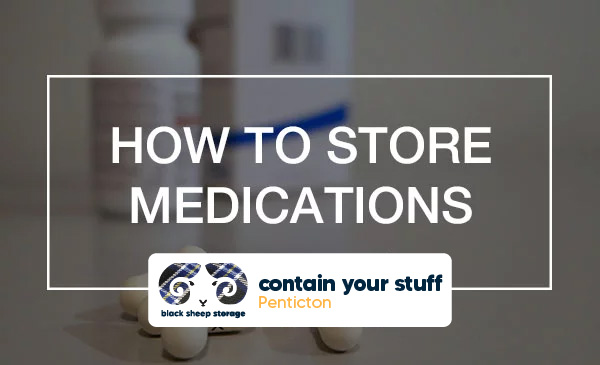Medications are an invaluable part of modern healthcare, but keeping them organized can be somewhat of a challenge. The good news is that there are plenty of easy ways to keep your meds from getting lost or damaged in storage. In this post, we’ll explain how you can safely store all kinds of medications so that they’re ready for when you need them.
How to Store Medications
Sunlight will degrade medication.
Sunlight is the #1 enemy of medication. The sun can cause the active ingredients to break down, rendering them less effective and possibly even harmful if not stored properly.
On a sunny day, you should keep your medications in a cool place, like your refrigerator or basement (but not freezer). If this isn’t an option for you, look for a safe place out of direct sunlight where they won’t be disturbed by children or pets; some people choose to store pills in their sock drawer or medicine cabinet because these areas are dark and unlikely to be accessed by little hands.
Heat will also degrade medications, so store your meds in a cool location.
Heat will also degrade medications, so store your meds in a cool location.
An air-conditioned room or closet is ideal for storing medication. If you don’t have one of those options available to you, try to find an area that stays close to 50 degrees Fahrenheit (10 degrees Celsius) and away from direct sunlight.
Don’t keep medicines near pets or children.
Most people don’t think of their pets as potential hazards, but they can be. If you have a cat or dog, keep your medicines out of reach and don’t put them in food dishes.
If a child accidentally swallows a tablet, call the poison control centre +1 800-567-8911.
Keep all medications in the original container, either original box or bottle, with the label intact.
It’s important to keep all medications in the original container, either original box or bottle, with the label intact.
- Store all medications in a cool place away from heat and light. Heat can destroy some medications as well as make them less effective when taken at another time. Light also damages some drugs’ potency over time so it’s best not to store them in places where they are exposed to direct sunlight (e.g., near windows).
- Keep all medicines out of reach of children and pets–even those that aren’t meant for humans–as well as any other household member who might accidentally ingest them by mistake (for example: if they were left on top of a table). Make sure there are no opportunities for accidental ingestion by storing your medicine cabinet high up on shelves or behind cupboard doors, so children cannot access them easily without adult supervision!
Unopened and sealed pharmaceuticals can be stored for as long as possible.
The longer you can store your medicines, the better. This is because each container has an expiration date on it that indicates when a particular medicine will be at full strength. If you have an unopened bottle of pills, for example, you’ll want to make sure they stay fresh until that date passes so that they’re still effective when taken later on. While most medications can be stored safely for years after their expiration dates (assuming they were stored correctly), some may lose potency quicker than others, depending on what ingredients are used in production and how sensitive those ingredients are to heat and humidity levels in different climates around the world.
If you’re unsure about whether something needs refrigeration or freezing during storage periods longer than 30 days–or if there’s any chance at all that it might go bad sooner rather than later–it’s best not only ask someone who knows what they’re talking about, but also check out online resources like Drugs dot com where pharmacists answer questions from patients like yours truly!
Opened pharmaceuticals can be safely stored for up to one year at room temperature.
- Opened pharmaceuticals can be safely stored for up to one year at room temperature.
- Keep out of direct sunlight and away from heat sources, such as windows or radiators.
- Avoid storing medications that require refrigeration in the refrigerator or freezer; they may become contaminated by food odours and moisture when they are brought back into the room-temperature environment after being stored in cold storage.
We hope this has been helpful for you. If you have any questions about storing your medications in self storage, send us an email!








